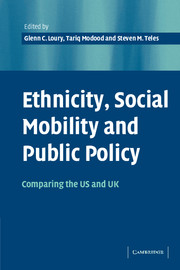Book contents
- Frontmatter
- Contents
- List of figures
- List of tables
- List of contributors
- Acknowledgements
- Introduction
- Part I Historical overviews
- Part II Informal social networks
- Part III Formal structures
- 9 Educational progress for African-Americans and Latinos in the United States from the 1950s to the 1990s: the interaction of ancestry and class
- 10 The educational attainments of ethnic minorities in Britain
- 11 Why America's black–white school achievement gap persists
- 12 Networks and niches: the continuing significance of ethnic connections
- 13 Nonwhite origins, Anglo destinations: immigrants in the USA and Britain
- 14 Social mobility of ethnic minorities
- 15 Ethnic minorities, employment, self-employment, and social mobility in postwar Britain
- Part IV Political institutions and processes
- Part V Normative analysis
- Author index
- Subject index
- References
10 - The educational attainments of ethnic minorities in Britain
Published online by Cambridge University Press: 22 September 2009
- Frontmatter
- Contents
- List of figures
- List of tables
- List of contributors
- Acknowledgements
- Introduction
- Part I Historical overviews
- Part II Informal social networks
- Part III Formal structures
- 9 Educational progress for African-Americans and Latinos in the United States from the 1950s to the 1990s: the interaction of ancestry and class
- 10 The educational attainments of ethnic minorities in Britain
- 11 Why America's black–white school achievement gap persists
- 12 Networks and niches: the continuing significance of ethnic connections
- 13 Nonwhite origins, Anglo destinations: immigrants in the USA and Britain
- 14 Social mobility of ethnic minorities
- 15 Ethnic minorities, employment, self-employment, and social mobility in postwar Britain
- Part IV Political institutions and processes
- Part V Normative analysis
- Author index
- Subject index
- References
Summary
By European standards Britain has good data-sources for identifying the current educational profile of the key ethnic minorities, and for tracking them over time. Data-sources include the census, though it was only in 1991 that an explicit ethnic group question was included; the PEP-PSI (Policy Studies Institute) surveys; the Labour Force Surveys (LFS); local education authority data; the Youth Cohort Survey; and national data on university entrants collected by the Universities Central Admissions Survey (UCAS) and the Higher Education Funding Councils. There is also an ethnographic literature about schools and young people, and a related theoretical and policy literature. In general, however, the data are nothing like as extensive or as detailed as those available in the USA.
The statistical data tend to show that scholastic achievement does vary by ethnicity but that at least on some measures racial disadvantage is declining and the circumstances of the minority groups are diverging. Some groups are poorly placed in educational and occupational hierarchies, others have overtaken the white population in the acquisition of qualifications and, consquently, in entry to some prestigious professions, though perhaps all minorities are underrepresented as managers in large establishments.
A developing pattern
The importance of educational attainments lies not just in their importance in accessing the better jobs and achieving social mobility. It is also significant because the attainments of (most) ethnic minority groups have proven to be quite remarkable, bearing in mind that one of the main stimuli to research on the educational attainments of nonwhite ethnic minority groups was the concern in the 1970s that children from these groups were “underachieving” in schools.
- Type
- Chapter
- Information
- Ethnicity, Social Mobility, and Public PolicyComparing the USA and UK, pp. 288 - 308Publisher: Cambridge University PressPrint publication year: 2005
References
- 16
- Cited by



